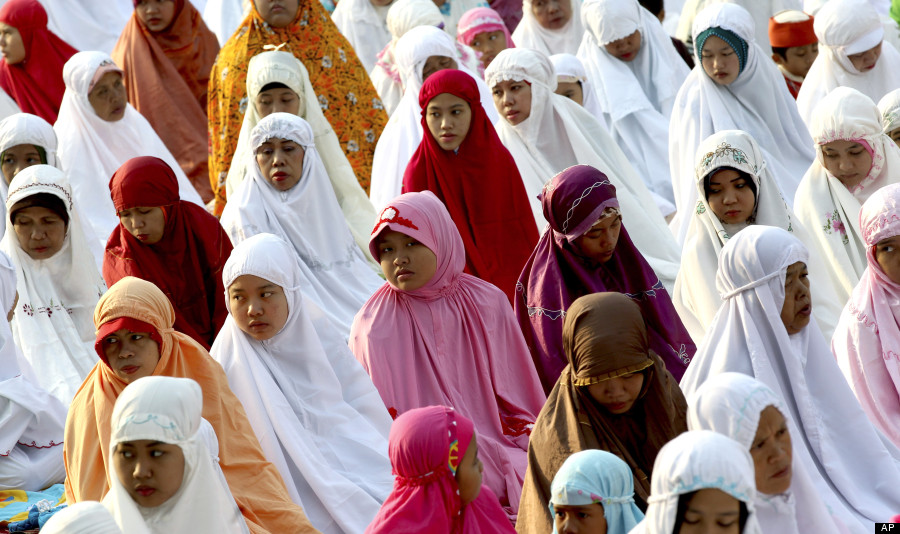The Meaningful Eid Al-Adha Celebration
Eid Al-Adha is an important and special commemoration for our Muslim friends. It’s the most significant celebration for our Muslim friends after Eid Al-Fitr. What does Eid Al-Adha mean?

Muslims perform a morning prayer marking the Eid al-Adha holiday in Jakarta, Indonesia, Sunday, October 5 2014. Photo: AP Photo/Tatan Syuflana
In this momentous Muslim celebration, we learn to understand the readiness of Prophet Ibrahim (or well known in the Bible as Abraham) to offer his own son in compliance with God’s will, even though God prefers him to sacrifice sheep instead of Ibrahim’s son. Eid Al-Adha is a celebration of this exceptional example of submission to God, which is the pillar of the Islamic faith. Furthermore, in the Arabic language, the word Islam means “submission”.
Indonesian people honour the Eid Al-Adha with not only spiritual but also with joyful spirit. The date of Eid al-Adha commemoration also differs worldwide in line with the Islamic lunar calendar and in Indonesia it will be celebrated this year on September 24.
For many countries with a majority Muslim population, Eid al-Adha is a public holiday which is marked by family gatherings, prayers and animal sacrifice. Many of my Muslim friends in Indonesia honour this special day by cooking together with their loved ones and preparing the meat in the spirit of Eid celebrations as a symbol of Ibrahim’s sacrifice to Allah (God).
Moreover, the Eid al-Adha celebration starts with morning prayers, followed by visits to family and friends also the exchange of gifts and foods. In the spirit of Eid Al-Adha, our Muslim friends also share their money and food with impoverished people so they can enjoy and engaged too in the Eid al-Adha observance.
Eid also represents the end of Hajj, the yearly pilgrimage to Saudi Arabia. What is Hajj? It’s the spiritual journey for our Muslim friends, to Mecca, the most religious Islamic site and is an important part of Moslem’s faith. Based on the Al-Quran, all Muslims who have enough money should travel to Saudi Arabia at least once in their life. Annually, 2 million Muslims will do the pilgrimage and stand in front of Kaaba, a shrine created by the Prophet Ibrahim and pray to God.
The pilgrimage ritual will be performed for five days, and the people will now be called as “Hajjs”, a phrase to honour those who completed the pilgrimage. In addition, the tough five-day hajj has the purpose to clean the devoted of sin. Furthermore, there is a saying from Prophet Muhammad in which he says, “a person who accomplished Hajj properly will come back as newly born spirit that is free from all sins” (seseorang yang selesai menuntaskan haji akan terlahir kembali sebagai jiwa baru yang terbebas dari dosa).
The Muslim community who experiencing Eid al-Adha not only become stronger in their spiritual state, but also they learn the true meaning of God’s love and mercy by also sharing their food and money to the underprivileged people. The spirit of Eid al-Adha strengthens the Muslim community worldwide. In conclusion, Eid al-Adha is truly remarkable month to have spiritual experience with God, to be closer with your loved ones and to practice valuable lessons of humanity.
Let’s listen to the experiences of our Indonesian friends who celebrate Eid Adha :
Nadhira Fatikhani:
“Eid Al-adha celebration to me might not be as festive as Eid Al-fitr where I can gather with my family and relatives, but it is a great reminder to us how the Prophet Ibrahim sacrificed his son, Ismail, for Allah. As a way to celebrate this, my family and relatives usually purchase cows and goats, sacrifice them and then give their meat away to the less fortunate people instead of enjoying it ourselves. Hopefully in the future, every person that is well-off could all celebrate Eid Al-adha will the less fortunate ones.”
Annisa Sabran :
“Eid Al-adha for me is about sacrifice. The act of loving Allah more than yourself, more than your family, more than your friends and more than your loved ones. The ultimate symbol of unconditionally loving your God.”
Fina Roza:
“Eid Al-adha always reminds me that sharing is caring, because not everyone can enjoy good food everyday, especially because meat is quite expensive in Indonesia. I am also reminded to be grateful to God, in a sense that we got the opportunity to share to others.
Our thoughts are with all those celebrating Eid Al-adha.

